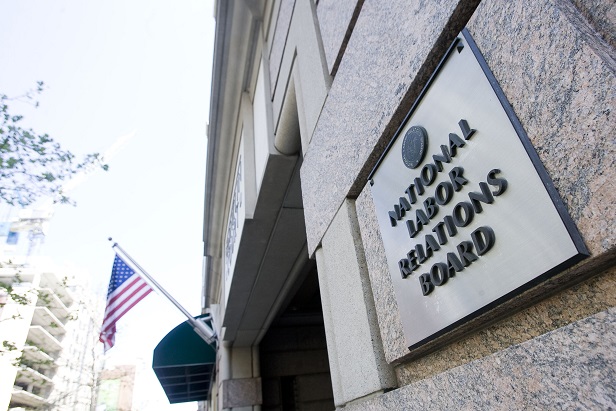 National Labor Relations Board, located at 1099 14th Street, NW, in Washington, D.C. April 16, 2012. (Photo: Diego M. Radzinschi/The National Law Journal)
National Labor Relations Board, located at 1099 14th Street, NW, in Washington, D.C. April 16, 2012. (Photo: Diego M. Radzinschi/The National Law Journal)
The National Labor Relations Board (NLRB) has issued a series of decisions in the last few months that include new parameters for arbitration agreements containing class and collective action waivers.
These decisions follow the U.S. Supreme Court's May 2018 decision in Epic Systems v. Lewis, 84 U.S. __, 138 S.Ct. 1612 (2018), where the court held that such employer-employee agreements mandating that employment disputes be resolved through individualized arbitration do not violate the National Labor Relations Act (NLRA) and must be enforced as written, pursuant to the Federal Arbitration Act (FAA).
Epic Systems arose out of a dispute in which the NLRB took the position that employer-mandated arbitration agreements requiring that employees waive the right to engage in class or collective litigation are unenforceable.
The NLRB argued that Section 7 of the NLRA protects an employee's right to engage in protected concerted activity, which includes litigating employment-related disputes as class or collective actions.
The NLRB also argued that Section 7 protects employees' rights to engage in protected concerted activity.
The Supreme Court rejected these positions and focused on the fact that Section 7 does not mention class or collective procedures and does not express any disapproval of arbitrations.
Nevertheless, on June 18, the NLRB found that an arbitration agreement that required employees to arbitrate "all claims and controversies" with their employer unlawfully restricted employees' access to the NLRB to adjudicate labor disputes. See Prime Healthcare Paradise Valley, 368 NLRB 10 (2019).
Then, on Aug. 14, the NLRB issued its order in Cordúa Restaurants, 368 NLRB 43 (2019), which expands on several important issues involving mandatory arbitration agreements following the Supreme Court's decision in Epic Systems.
In Cordúa Restaurants, the NLRB affirmed the right of employers to require its employees to sign mandatory arbitration agreements prohibiting them from opting into a collective action in a Fair Labor Standards Act claim for overtime pay.
The NLRB also concluded that the NLRA does not prohibit an employer from threatening to discharge an employee who refuses to sign such an agreement.
However, the NLRB determined that employers could not take adverse actions against employees who engage in concerted activity by filing a class or collective action. Thus, the NLRB's decision draws a line between arbitration agreements and other types of employer action that may tend to interfere with Section 7 employee activities.
Just two days later, on Aug. 16, the NLRB issued the last of its trilogy of decisions relating to arbitration agreements in Bud's Woodfire Oven, 368 NLRB 45 (2019).
Like many employers, Bud's Woodfire Oven d/b/a Ava's Pizzeria required its employees to agree to the arbitration of "any and all disputes" arising from the employment relationship and limited "any relief or recovery to the arbitrator's award." Specifically, the arbitration agreement provided:
Nothing in this agreement precludes employee from filing a charge or from participating in an administrative investigation of a charge before any appropriate government agency. However, employee understands and agrees that Employee cannot obtain any monetary relief or recovery from such a proceeding.
The NLRB found that this language "explicitly interfered with employees' Section 7 rights to file charges" with the NLRB and prohibited them from obtaining any remedies through the NLRB. As such, the NLRB ordered the employer to:
- Rescind the mandatory arbitration agreement in all its forms or revise it in all its forms to make clear to employees that the agreement does not bar or restrict employees' right to file charges with and obtain remedies from the National Labor Relations Board.
- Notify all current and former employees who were required to sign or otherwise become bound to the arbitration agreement in any form that the agreement has been rescinded or revised and, if revised, provide them with a copy of the revised agreement.
This trilogy of NLRB decisions carries significant implications for all private sector employers who use or contemplate using employer-employee agreements.
While arbitration agreements and class/collective action waivers do not violate the NLRA—and may even be implemented in response to litigation—the NLRB has made it abundantly clear that employers must ensure that these agreements do not restrict an employee's right to file charges with the NLRB or obtain relief under the NLRA.
 Suhaill M. Morales is a partner in the Miami office of Allen Norton & Blue, the statewide law firm devoted exclusively to the practice of labor and employment law. Contact her at [email protected].
Suhaill M. Morales is a partner in the Miami office of Allen Norton & Blue, the statewide law firm devoted exclusively to the practice of labor and employment law. Contact her at [email protected].
© 2025 ALM Global, LLC, All Rights Reserved. Request academic re-use from www.copyright.com. All other uses, submit a request to [email protected]. For more information visit Asset & Logo Licensing.







